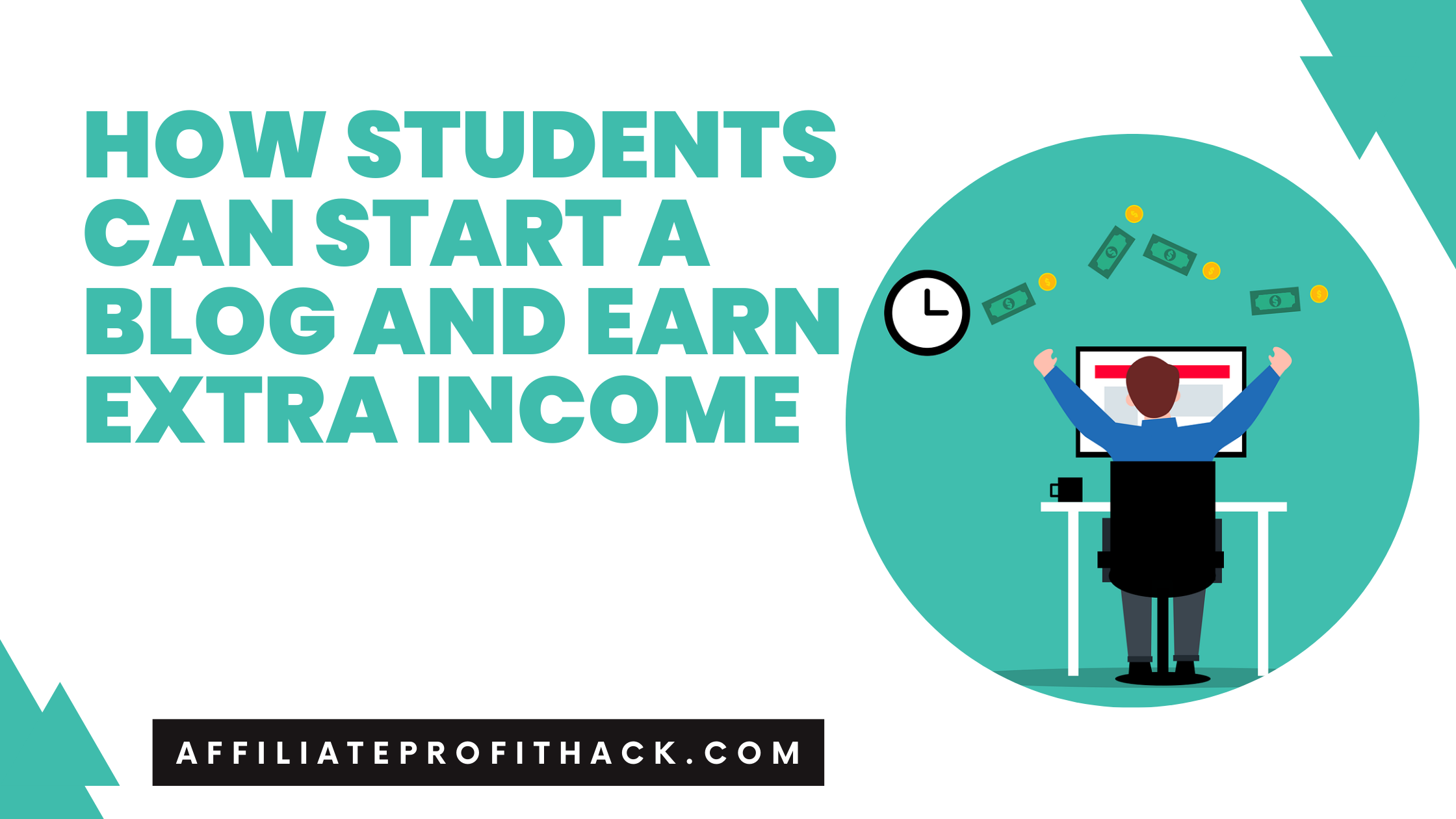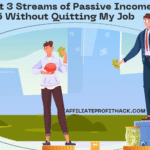Welcome to my article “How Students Can Start a Blog and Earn Extra Income”.
Who says you need to wait for a degree to start making money? Sure, being a student comes with its perks—endless ramen, questionable sleep schedules, and the thrill of pulling off last-minute assignments. But wouldn’t it be nice to have some extra cash to upgrade that instant noodle stash or fund your weekend adventures? Enter blogging: a fun, creative, and surprisingly profitable side hustle that fits perfectly into a student’s life.
Still skeptical? Think of it this way: starting a blog is cheaper than most textbooks, way less stressful than group projects, and infinitely more rewarding than scrolling through TikTok for hours. And the best part? You can do it all from the comfort of your dorm room (or bed, let’s be real). So, grab your laptop, flex those creative muscles, and let’s dive into how you can start a blog and turn it into a money-making machine—even on a student budget.
My Best Recommended & Proven Way to Make $100-$300 Daily – Watch This FREE Video to START >>>

Why Blogging Is a Great Option for Students
Let’s face it—being a student is like running a marathon with your hands tied behind your back. Between lectures, assignments, and maintaining some semblance of a social life, finding time for a part-time job can feel impossible. That’s where blogging swoops in like a caped hero, offering a flexible, creative way to earn extra income without turning your schedule into a stress-fest.
Blogging works on your terms. Want to write at 2 a.m. in your pajamas while bingeing your favorite show? Go for it. Prefer to knock out a post between classes or during your weekend coffee ritual? Totally doable. Unlike traditional jobs with rigid hours (hello, retail shifts that ruin your Friday nights), blogging lets you be the boss. It’s your schedule, your rules.
And let’s not forget the glow-up your skills will experience. Blogging isn’t just about writing—it’s about learning SEO (so people can actually find your blog), social media marketing (because, #promo), and even a bit of graphic design (free tools like Canva are your new BFF). These are skills that not only help you make money now but also look amazing on a resume. You’re not just a student anymore; you’re a content creator, digital marketer, and budding entrepreneur.
Oh, and did I mention the money? Blogging can start as a trickle—maybe a few bucks from ads or affiliate links—but with consistency, it can grow into a steady stream of income. Plus, there’s something oddly satisfying about earning money from something you actually enjoy doing. Forget flipping burgers or folding clothes; blogging lets you monetize your passions, whether it’s gaming, fashion, fitness, or even how to survive on a student budget (meta, right?).
In short, blogging isn’t just a side hustle; it’s a ticket to financial independence, creative freedom, and a crash course in real-world skills. And honestly, what student wouldn’t want that?
Choosing the Right Niche: Setting Yourself Up for Success
Picking a niche for your blog is like choosing your major—but way less intimidating and with fewer existential crises. Your niche is the foundation of your blog, the thing that makes people stop scrolling and think, “Hey, this person gets me!” Get it right, and you’re on the fast track to blogging success. Get it wrong, and, well…you’re writing into the void (cue crickets). So, how do you pick the perfect niche? Let’s break it down.
First things first: what do you love talking about? Whether it’s gaming, cooking, fitness, or the art of surviving on three hours of sleep, your niche should be something you genuinely enjoy. Why? Because if you’re not excited about your topic, chances are your readers won’t be either. Plus, blogging requires consistency, and trust me, it’s a lot easier to write weekly posts when you’re geeking out about something you adore.
My Best Recommended & Proven Way to Make $100-$300 Daily – Watch This FREE Video to START >>>
Next up, let’s get practical: is there an audience for your passion? A blog about your pet rock collection might be super niche—but is it too niche? Use tools like Google Trends or AnswerThePublic to see what people are searching for in your area of interest. If it turns out thousands of people want tips on thrifting trendy outfits or mastering a killer study schedule, you’ve struck blogging gold.
Now, let’s talk money. Certain niches have a better earning potential than others. For example, blogs about personal finance, tech reviews, or fitness tend to attract high-paying advertisers and affiliate opportunities. But that doesn’t mean you should ditch your love for vegan recipes or travel hacks. The key is finding a way to blend your passion with what people want to read—and spend money on.
Lastly, remember to be you. Your niche might not be 100% unique (spoiler alert: most niches aren’t), but your personality is. Readers don’t just follow blogs for tips and tricks; they follow because they connect with you. So, whether you’re the funny foodie, the no-nonsense productivity guru, or the sassy fashionista, let your voice shine through.
Choosing your niche is your first big blogging decision, but don’t overthink it. Start with what you know and love, and as you grow, your audience will help guide the way. After all, the best niche is the one that feels like home.
Getting Started: Setting Up Your Blog on a Budget
Let’s be real—most students don’t have piles of cash lying around to blow on a fancy blog setup. Luckily, starting a blog doesn’t require a trust fund or a loan from your overly skeptical parents. With a little strategy and some smart choices, you can launch a professional-looking blog on a budget so tight even your wallet will thank you.
First up: choose your blogging platform. Think of this as your blog’s home base. For beginners, platforms like WordPress.org are the go-to. It’s free, flexible, and packed with features that’ll grow with you. If you’re feeling a bit overwhelmed by the technical side, other options like Blogger or Wix offer beginner-friendly interfaces—but keep in mind they may have limitations when it comes to monetization and customization.
Next, let’s talk hosting. This is where your blog lives on the internet, and yes, you’ll need to pay for it. But don’t worry; there are plenty of affordable options like Bluehost, SiteGround, or Hostinger that cost less than a cup of coffee per month (okay, maybe a fancy coffee, but still). Most hosting services even include a free domain name for the first year, which is a nice bonus.
Speaking of domain names, this is your blog’s address (like www.yourcoolblogname.com). Keep it short, memorable, and easy to spell—no one wants to type epicblogg3rzz2024.net. Pro tip: pick something that hints at your niche or personality, so readers know what to expect.
Now for the fun part: customizing your blog. Free themes are your best friend here. WordPress has a ton of sleek, modern options that won’t cost you a dime. As for visuals, tools like Canva and Unsplash let you create stunning graphics and find professional-looking photos—again, for free! Your blog doesn’t have to scream “budget” just because it’s built on one.
Finally, get your first posts live. You don’t need a dozen articles to launch—just a few solid ones that showcase what your blog is all about. Start with an “About Me” page (everyone loves a good backstory), and maybe toss in a couple of helpful guides or fun listicles to reel in your first readers.
And there you have it—a fully functional blog without blowing your student budget. You’ve just taken the first step toward blogging greatness, and all it took was a little creativity and some savvy spending. Who knew starting a business could be cheaper than a semester’s worth of textbooks?
Creating Quality Content: The Secret to Building an Audience
If your blog were a sandwich, quality content would be the filling—because let’s face it, no one comes for the bread. Whether you’re dishing out study hacks, fashion advice, or memes only your niche audience gets, the secret sauce to blogging success is creating content that keeps readers coming back for seconds (and thirds).
So, what exactly makes content “quality”? First off, it has to be helpful. Your readers aren’t just killing time; they’re looking for answers, inspiration, or maybe just a laugh. If your post promises “10 Study Hacks to Ace Finals,” it better deliver tips that don’t involve simply “study harder.” Share actionable advice, personal insights, or unique takes that they won’t find in every other corner of the internet.
My Best Recommended & Proven Way to Make $100-$300 Daily – Watch This FREE Video to START >>>
Next, don’t just write for you—write for them. Imagine your ideal reader. What are they Googling at 2 a.m.? What problems are they trying to solve? Use tools like AnswerThePublic or Ubersuggest to figure out what’s trending in your niche and tailor your posts to those questions. For bonus points, sprinkle in some SEO (search engine optimization) magic—think keyword-rich titles, meta descriptions, and headers. This makes it easier for your blog to pop up on search engines, a.k.a., the digital holy grail of free traffic.
Now, let’s talk tone. Your blog is your stage, and your voice is the star. Whether you’re sarcastic, upbeat, or straight-to-the-point, let your personality shine through. Readers don’t just want tips; they want to connect with you. Crack a joke, share a personal anecdote, or toss in a gif—it’s these little touches that keep your audience engaged.
And please, for the love of all things digital, make your content visually appealing. No one wants to read a giant wall of text, even if it’s pure gold. Use short paragraphs, subheadings, bullet points, and images to break things up. Free tools like Canva can help you whip up custom graphics or infographics that make your posts pop.
Lastly, don’t underestimate the power of consistency. You don’t need to publish every day, but you do need to show up regularly. Whether that’s once a week or twice a month, stick to a schedule so your audience knows when to expect fresh content. Think of it like your favorite TV show—regular episodes keep the fans loyal.
Creating quality content isn’t rocket science, but it does take effort. The good news? Each post is an investment in your blog’s future. With every article, you’re not just building an audience; you’re building trust—and that’s the real secret to turning casual readers into loyal fans (and maybe even paying customers).
Monetization Strategies: How Students Can Earn Extra Income
You have got your blog up and running, and your content is fire. Now comes the fun part—making money. Blogging isn’t just a creative outlet; it’s also a legit way to earn some extra cash. And the best part? You don’t need a million readers to start monetizing. With the right strategies, even a small, engaged audience can help you turn your blog into a money-making machine. Let’s break it down.
1. Affiliate Marketing: Earn While You Recommend
Affiliate marketing is like being a digital matchmaker—you recommend products or services you love, and when your readers click and buy, you earn a commission. Platforms like Amazon Associates, ShareASale, and CJ Affiliate make it easy to get started. The key here is to recommend things that align with your niche. If you’re running a fitness blog, for example, you might promote workout gear, meal plans, or fitness apps. Authenticity is everything—your readers can spot a cash grab from a mile away.
2. Display Ads: Get Paid for Page Views
Ever seen those banner ads on blogs? That could be your blog making money. Ad networks like Google AdSense or Mediavine pay you based on the number of views and clicks their ads generate. While ads won’t make you a millionaire overnight, they’re a great way to earn passive income as your traffic grows. Just don’t go overboard—too many ads can make your blog look like a cluttered billboard.
3. Sponsored Content: Partner with Brands
Once you’ve built a bit of an audience, brands might want to work with you to promote their products or services. Sponsored content is essentially paid collaborations where you write a post, create a video, or share on social media about the brand. Not sure where to start? Platforms like Influence.co or AspireIQ can help connect you with potential sponsors. Just remember to stay true to your blog’s vibe—your readers trust you for a reason.
4. Digital Products: Create and Sell Your Own Stuff
Why recommend someone else’s product when you can create your own? Selling digital products like e-books, templates, study guides, or online courses is a great way to monetize your expertise. For instance, if you’re a study pro, you could create a downloadable study planner. Tools like Gumroad or Teachable make it easy to sell your creations directly through your blog. Bonus: once you’ve made the product, it can keep generating income without much extra effort.
5. Freelance Opportunities: Showcase Your Skills
Your blog isn’t just a platform; it’s also a portfolio. Use it to showcase your writing, photography, or design skills and attract freelance clients. Websites like Upwork, Fiverr, or even social media can help you find gigs. Whether it’s writing articles for other blogs, managing social media accounts, or designing logos, your blog can be the launchpad for a side hustle that pays.
6. Memberships and Subscriptions: Build a Loyal Community
If you’ve built a loyal audience, consider creating premium content they can access for a small fee. Platforms like Patreon or Buy Me a Coffee let you offer exclusive posts, behind-the-scenes content, or even one-on-one coaching sessions. It’s a great way to deepen your connection with your audience while earning steady income.
7. Sell Physical Products or Merch
Feeling entrepreneurial? Selling physical products like T-shirts, mugs, or stickers with your blog’s branding can be a fun way to engage your audience. Tools like Printful or Shopify let you set up an online store with minimal upfront costs.
Blog monetization isn’t a one-size-fits-all deal—you can mix and match these strategies to find what works for you. Start small, focus on providing value, and the money will follow. Just remember: blogging isn’t a get-rich-quick scheme, but with time and effort, it can be a rewarding (and profitable) adventure. Plus, how cool would it be to tell your friends, “Yeah, my blog paid for that”?
Conclusion
Blogging might sound like a big undertaking, but here’s the truth: anyone can do it, and that includes you. Sure, there’s a bit of a learning curve (hello, SEO and WordPress quirks), but it’s nothing a determined student can’t handle. Plus, the rewards are totally worth it. You’re not just building a blog; you’re building a side hustle, a portfolio, and maybe even a future full of financial independence.
Think about it—where else can you express yourself, share your passions, and earn money while doing it? Blogging is like having the ultimate creative outlet that also pays the bills. It’s flexible enough to fit into your busy student life, and every post you publish is a step closer to achieving your goals, whether that’s paying for textbooks, funding your coffee addiction, or saving up for that dream summer trip.
My Best Recommended & Proven Way to Make $100-$300 Daily – Watch This FREE Video to START >>>
So, what are you waiting for? Your blog won’t start itself. Grab your laptop, pick a niche that excites you, and take that first step. Maybe it’s brainstorming topics, setting up your website, or writing your very first post. Whatever it is, just start. You don’t need to be perfect; you just need to begin.
Remember, even the biggest bloggers started with zero readers and a lot of questions. With consistency, creativity, and a dash of humor, you’ll not only figure it out—you’ll thrive. And who knows? In a few months, you might just be the one writing a blog post about how students can start a blog and earn extra income. Full circle moment, right?
Thank you for reading my article “How Students Can Start a Blog and Earn Extra Income” till the end. Hope it helped you. See you with another article.










